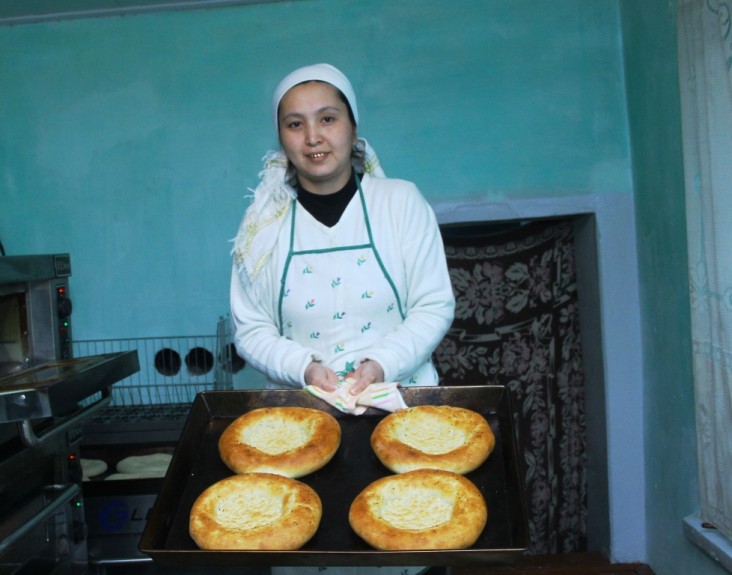
Feb. 2015—Every morning before dawn, Feruza Nodirova hurries to her bakery called Meerim located in the city of Osh in the southern region of the Kyrgyz Republic. The small bakery room is warm and cozy. Cooling cabinets stand along the wall, and fresh bread and rolls sit on the shelves.
The bakery manager, Nurjamal Madmarova, has already laid out flour and is kneading the dough. Together, the two women bake bread, rolls, gingerbread and cookies before lunch. Sometimes on request they bake samsas (a traditional dish), cakes and pies.
The bakery’s significance, however, goes beyond its tasty offerings. It was borne from a women’s peace-building project to unite ethnic groups in areas of the country subject to conflict.
Until 2013, 35-year-old Madmarova, a mother of three, was a typical housewife. Like her neighbors, she was unemployed. Though she had always been good at baking, she did not have any production facilities.
“My friends told me that there was an organization supporting women’s projects. I thought, why don’t I try? My relatives and friends supported me,” recounted Madmarova
She applied for a small grant under USAID’s Women’s Peace Banks project implemented by the Eurasia Foundation of Central Asia. Her proposal was accepted and, in October 2013, she received an oven, a kneading machine, a food processor and pastry molds.
“Do not be afraid to have bold ideas!” she advises.
Madmarova is now able to earn a living and take care of her family by doing what she likes. Moreover, she was able to create another job for a neighbor, Feruza Nodirova, thus creating a multiplier effect for a single loan.
“I was also unemployed at that time and accepted Nurjamal’s invitation to join her,” said Nodirova, 41.
The two women met a long time ago. Madmarova is Kyrgyz and Nodirova is Uzbek. “We are like sisters,” they say almost in unison, smiling. They supported each other even during the tragic events of 2010 in the south of the Kyrgyz Republic, when a conflict between Kyrgyz and Uzbek communities broke out claiming hundreds of lives and destroying entire neighborhoods.
“That tragedy didn’t divide us in any way. We supported each other. The stores were closed, and we helped each other when one of us ran out of bread or when the other had butter,” said Madmarova.
Thanks to the Women’s Peace Banks project, the two women of different nationalities continue to work together and help build community trust, demonstrating that ethnic Kyrgyz and Uzbeks can be good friends and work together supporting each other in everyday life.
The USAID Women’s Peace Banks Project is empowering women in the southern regions of the Kyrgyz Republic to lead community-based, interethnic reconciliation initiatives, and promotes women’s role in local peace building. The project aims to strengthen cooperation and trust between women in communities recovering from conflict, and to increase the role of women in mitigating conflicts.
Over 600 women like Madmarova and Nodirova were involved in more than 130 projects that brought together representatives of different ethnic groups under the project, which ran from June 2012 to December 2014.
“All problems are much easier to solve when you are not alone,” says Madmarova.
LINKS







Comment
Make a general inquiry or suggest an improvement.